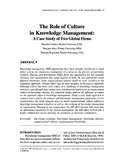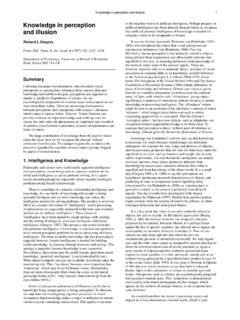Transcription of Evidence for action - World Health Organization
1 ADHERENCE TO LONG-TERM THERAPIESE vidence for actionWorld Health Organization 2003 WHO Library Cataloguing-in-Publication DataAdherence to long-term therapies: Evidence for Patient compliance. 2. Long-term care. 3. Drug therapy utilization. 4. Chronic disease Health behavior. 6. Evidence -based medicine. I. WHO Adherence to Long Term Therapies Global Adherence Interdisciplinary 92 4 154599 2(NLM classification: W 85) World Health Organization 2003 All rights of the World Health Organization can be obtained from Marketing and Dissemination, World Health Organization , 20 Avenue Appia, 1211 Geneva 27, Switzerland (tel: +41 22 791 2476;fax: +41 22 791 4857; email: Requests for permission to reproduce or translateWHO publications whether for sale or for noncommercial distribution should be addressed toPublications, at the above address (fax: +41 22 791 4806.))
2 Email: designations employed and the presentation of the material in this publication do not imply theexpression of any opinion whatsoever on the part of the World Health Organization concerning thelegal status of any country, territory, city or area or of its authorities, or concerning the delimitation of its frontiers or boundaries. Dotted lines on maps represent approximate border lines for which theremay not yet be full mention of specific companies or of certain manufacturers products does not imply that they are endorsed or recommended by the World Health Organization in preference to others of a similarnature that are not mentioned. Errors and omissions excepted, the names of proprietary products aredistinguished by initial capital World Health Organization does not warrant that the information contained in this publication is complete and correct and shall not be liable for any damages incurred as a result of its in correspondence should be sent to the author.
3 Eduardo Sabat , World Health Organization ,avenue Appia 20, CH-1211 Geneva 27, Switzerland Requests for free electroniccopies (pdf format only) should be sent to: writersVIIII ntroductionXITake-home messagesXIIIS ection I Setting the scene1 Chapter I Defining adherence3 Chapter II The magnitude of the problem of poor adherence7 Chapter III How does poor adherence affect policy makers and Health managers?11 Section II Improving adherence rates: guidance for countries17 Chapter IV Lessons learned19 Chapter V Towards the solution27 Chapter VI How can improved adherence be translated into Health and economics benefits?39 Section III Disease-specific reviews45 Chapter VII Asthma47 Chapter VIII Cancer (palliative care)59 Chapter IX Depression65 Chapter X Diabetes71 Chapter XI Epilepsy87 Chapter XII HIV/AIDS95 Chapter XIII Hypertension107 Chapter XIV Tobacco smoking cessation115 Chapter XV Tuberculosis123 Annexes133 Annex I Behavioural mechanisms explaining adherence135 Annex II Statements by stakeholders151 Annex III Table of reported factors by condition and dimension162 Annex IV Table of reported interventions by condition and dimension166 Annex V Global adherence interdisciplinary network (GAIN)
4 171 Where to find a copy of this book177 Official designated depositories libraries for WHO publications179 Reference libraries for WHO publications183 WHO official sales agents World wide195 Selected WHO publications of related interest197A ready-to-use pamphlet for partners willing to promote this book199 WHO 2003IV PrefaceOver the past few decades we have witnessed several phases in the development of approaches aimedat ensuring that patients continue therapy for chronic conditions for long periods of time. Initially thepatient was thought to be the source of the problem of compliance .Later,the role of the providers was also addressed. Now we acknowledge that a systems approach is required. The idea of complianceis associated too closely with blame, be it of providers or patients and the concept of adherence is abetter way of capturing the dynamic and complex changes required of many players over long periodsto maintain optimal Health in people with chronic report provides a critical review of what is known about adherence to long-term therapies.
5 This isachieved by looking beyond individual diseases. By including communicable diseases such as tuberculo-sis and human immunodeficiency virus/acquired immunodeficiency syndrome; mental and neurologicalconditions such as depression and epilepsy; substance dependence (exemplified by smoking cessation);as well as hypertension, asthma and palliative care for cancer, a broad range of policy options , this broader focus highlights certain common issues that need to be addressed with respectto all chronic conditions regardless of their cause. These are primarily related to the way in which healthsystems are structured, financed and hope that readers of this report will recognize that simplistic approaches to improving the quality oflife of people with chronic conditions are not is required instead, is a deliberative approachthat starts with reviewing the way Health professionals are trained and rewarded, and includes systemati-cally tackling the many barriers patients and their families encounter as they strive daily to maintain opti-mal report is intended to make a modest contribution to a much-needed debate about provides analysis and solutions, it recommends that more research be conducted.
6 But criticallyacknowledges the abundance of what we already know but do not apply. The potential rewards forpatients and societies of addressing adherence to long-term therapies are large. WHO urges the readers of this report to work with us as we make the rewards Ya c hJanuary 2003 VWHO 2003 WHO 2003VI AcknowledgementsThis report was edited by Eduardo Sabat , WHO Medical Officer responsible for coordinating the WHOA dherence to Long-term Therapies Project, Noncommuniclable Diseases appreciation is due to Rafael Bengoa, who envisioned the project and shaped the most crucialelements of the report, Derek Yach, who provided consistent support, intellectual stimulation and leader-ship to the project and Silvana De Castro.
7 Who provided valuable assistance with the many bibliograph-ical reviews and with the writing of specific sections of this appreciation goes to the scientific writers who provided their ideas and the material for thereport. Their dedication and voluntary contributions have been central to this work. Thanks are also dueto all the participants from WHO and the Global Adherence Interdisciplinary Network (GAIN) who bytheir continuous involvement and input during the planning, resource collection and writing phases ofthis project have given breadth and depth to the thanks go to Steve Hotz for his intellectual support and hard work in helping to integrate theinformation on behavioural knowledge and its practical implications.
8 Several international professionalassociations, in particular the International Society of Behavioural Medicine, the International Council ofNurses, the International Union of Psychological Sciences, the International Pharmaceutical Federation,and the World Organization of Family Doctors have played an important role in providing moral sup-port and valuable input to the are also due to Susan Kaplan, who edited the final text, and Tushita Bosonet, who was responsi-ble for the artistic production of this report was made possible through the generous financial support of the gov-ernements of United Kingdom, Finland, Netherlands, Norway and Switzerland. VIIWHO 2003 Scientific writersThe scientific writers who were invited to contribute to the report are recognized scientists in adherence-related issues.
9 Their contributions were made voluntarily and have been incorporated following thedirections of the editor of the report. All of them signed a Declaration of Interest. They are listed belowin alphabetical order by topic. ( Team leaders are indicated with an asterisk.)WHO 2003 VIII AsthmaBender,Bruce Head Pediatric Behavioral Health ,National Jewish Medical and Research Center USAB oulet, Louis-Philippe Professor Laval University,Laval Hospital CanadaChaustre, Ismenia Attending Physician andProfessor JM de los R os Children s Hospital VenezuelaRand, Cynthia* Associate Professor JohnsHopkins University USAW einstein, Andrew Researcher and ClinicalPractitioner Christiana Medical Center USAWith the active support of the WHO-NMH/MNC/Chronic Respiratory Diseases unitBehavioural mechanismsHotz Stephen* University Research Fellow University of Ottawa CanadaKaptein, Ad A.
10 Head Psychology unit, LeidenUniversity Medical Centre The NetherlandsPruitt, Sheri Director of Behavioral Medicine Permanente Medical Group USAS anchez Sosa, Juan Professor NationalUniversity of Mexico MexicoWilley, Cynthia Professor of Pharmacoepidemio-logy University of Rhode Island USAC ancerDe Castro, Silvana* Technical Officer AdherenceProject, Department of Managment ofCommunicable Diseases, WHO SwitzerlandSabat , Eduardo Medical Officer AdherenceProject, Department of Managment ofCommunicable Diseases, WHO SwitzerlandWith the active support of the WHO-NMH/MNC/Program on Cancer Control unitDepressionPeveler, Robert* Head Mental Health Group,Community Clinical Sciences Division, School ofMedicine, University of Southampton EnglandTejada, M ar ia Luisa Clinical practitioner Hospitalof Nyon SwitzerlandWith the active support of the WHO-NMH/MSD/Mental and behavioural disordersunitDiabetesKarkashian, Christine* Dean School ofPsychology, Latina University Costa RicaSchlundt, David Associate Professor ofPsychology Vanderbilt University USAWith the active support of the WHO-NMH/MNC/Diabetes unitEpilepsyAvanzini, Giuliano President InternationalLeague against Epilepsy Italy de Boer, Hanneke M.

















